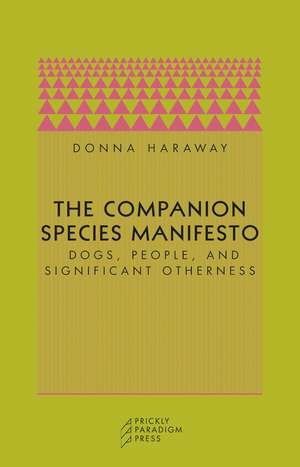The Companion Species Manifesto: Dogs, People, and Significant Otherness
Autor Donna J. Harawayen Limba Engleză Paperback – apr 2003
The Companion Species Manifesto is about the implosion of nature and culture in the joint lives of dogs and people, who are bonded in "significant otherness." In all their historical complexity, Donna Haraway tells us, dogs matter. They are not just surrogates for theory, she says; they are not here just to think with. Neither are they just an alibi for other themes; dogs are fleshly material-semiotic presences in the body of technoscience. They are here to live with. Partners in the crime of human evolution, they are in the garden from the get-go, wily as Coyote. This pamphlet is Haraway's answer to her own Cyborg Manifesto, where the slogan for living on the edge of global war has to be not just "cyborgs for earthly survival" but also, in a more doggish idiom, "shut up and train."
Preț: 65.56 lei
Nou
Puncte Express: 98
Preț estimativ în valută:
12.55€ • 13.05$ • 10.36£
12.55€ • 13.05$ • 10.36£
Carte disponibilă
Livrare economică 22 martie-05 aprilie
Livrare express 11-15 martie pentru 32.10 lei
Preluare comenzi: 021 569.72.76
Specificații
ISBN-13: 9780971757585
ISBN-10: 0971757585
Pagini: 112
Ilustrații: 7 halftones
Dimensiuni: 114 x 178 x 8 mm
Greutate: 0.09 kg
Ediția:1
Editura: Prickly Paradigm Press
Colecția Prickly Paradigm Press
Locul publicării:United States
ISBN-10: 0971757585
Pagini: 112
Ilustrații: 7 halftones
Dimensiuni: 114 x 178 x 8 mm
Greutate: 0.09 kg
Ediția:1
Editura: Prickly Paradigm Press
Colecția Prickly Paradigm Press
Locul publicării:United States
Notă biografică
Donna Haraway is a professor in the History of Consciousness Department, UC-Santa Cruz.
Cuprins
Emergent Naturecultures
Prehensions
Companions
Species
Evolution Stories
Love Stories
Training Stories
Positive Bondage
Harsh Beauty
Apprenticed to Agility
The Game Story
Breed Stories
Great Pyrenees
Australian Shepherds
A Category of One's Own
Recenzii
“Does Haraway provide a convincing answer to the question, ‘Why dogs?’ . . . Haraway has provided us with a method, a way of being critical in and about the world. She provides the tools to undermine powerful and established understandings by asking simple yet profound questions and by making seemingly absurd connections. She sees the significant and remarkable in the everyday and quotidian. Whether we are all capable of matching the mental agility, humour and acumen that she brings to the task is of course another question.”
